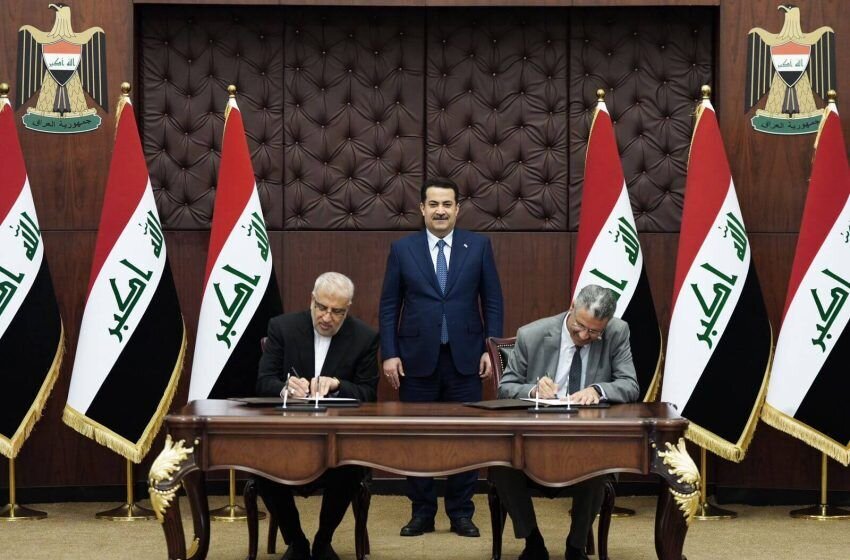Tehran pushing for energy diplomacy in neighboring Iraq

TEHRAN - Iran's policy in Iraq after Saddam Hussein's regime has been to strengthen bilateral cooperation in all fields including political, economic, and security.
Unfortunately, due to the war that was imposed on Iraq during the rule of Saddam Hussein and the terrorist acts after the fall of the regime, this country has faced a lot of problems, especially in the energy sector.
In the meantime, the main policy of the Islamic Republic of Iran has been to support a stable and peaceful Iraq by expanding economic activities with this country.
Iraq is highly dependent on oil revenues, and the driving engine of this country is its oil industry, and taking this issue into account, the Islamic Republic has been following new strategies for bilateral cooperation in the field of energy.
Iran and Iraq are important members of OPEC, and they have had significant cooperation in this organization; there are also common oil fields between the two countries, which have expanded the capacities of bilateral cooperation.
Back in November 2022, Iranian President Ebrahim Raisi said his country was seeking expansion of energy ties with neighbor Iraq and called on Baghdad to take the necessary measures for collaboration in developing joint oil fields.
Raisi made the remarks in a joint press conference with Prime Minister of Iraq Mohammed Shia' al-Sudani who arrived in the Iranian capital on November 29 to hold talks with the authorities of the Islamic Republic.
“Fortunately, today Iran and Iraq have very good and close cooperation in a wide range of political, economic, security, social, cultural, scientific, and technological areas, and we hope that this cooperation will be improved in the future,” Raisi said.
Later in April this year, Iraqi President Abdul Latif Rashid traveled to Iran for a one-day official visit at the invitation of President Raisi. It was Abdul Latif Rashid's first trip to Iran after taking the post of Iraqi president.
During the meeting with his Iraqi counterpart, Raisi put great emphasis on boosting Tehran-Baghdad relations and promoting their cooperation in infrastructure fields, including water, electricity, gas, and energy sectors.
The president added the two countries need to meet each other’s needs by utilizing and developing their capacities.
Now less than two weeks after the two presidents’ meeting, Iranian Oil Minister Javad Oji traveled to Baghdad on top of a senior delegation to explore ways of expanding ties in the areas stressed by the heads of the governments.
Prior to Oji’s visit to the neighboring country, Iran-Iraq Joint Supreme Committee held a meeting to discuss the common areas that would be discussed and agreed upon during Oji’s stay in Baghdad.
Iran’s Deputy Oil Minister for International Affairs and Trade Ahmad Asadzadeh was the head of the Iranian delegation in the session, during which bilateral cooperation in the development of joint fields, export of technical and engineering services, and implementation of memorandums of understanding (MOUs) in the oil industry were thoroughly discussed.
Oji, who arrived in Baghdad on Wednesday, signed an MOU with his Iraqi counterpart Hayan Abdul Ghani to cooperate in developing the joint oil fields situated along the shared border between the two nations.
The MOU was signed in a ceremony attended by Iraqi Prime Minister Mohammad Shia al-Sudani.
As reported by the Iranian Oil Ministry’s news portal Shana, the MOU encapsulates cooperation between the two countries in oil, gas, and petrochemical projects.
Based on the document, the two sides will take the necessary measures for the development of shared oil fields, cooperation in the extraction of crude oil, its processing and refinement, and technological dealings with associated gas.
During the signing ceremony, al-Sudani proposed that the Islamic Republic of Iran could also participate seriously in the petrochemical industry and the training of Iraqi oil ministry personnel. The Iraqi side’s proposal was welcomed by the Iranian minister.
Earlier that day, the Iraqi Minister of Electricity, in his meeting with the Iranian Oil Minister, characterized the negotiations between the two sides as "fruitful," expressing a keen interest in fostering cooperative partnerships aimed at the development of the energy sector.
EF/MA
Photo: Iranian Oil Minister Javad Oji (L) and his Iraqi counterpart Hayan Abdul Ghani sign MOU documents as Iraqi Prime Minister Mohammad Shia al-Sudani looks upon.
